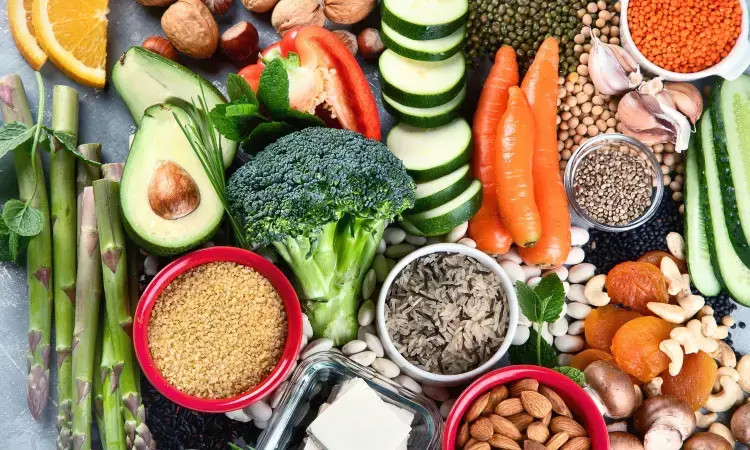- Home
- Medical news & Guidelines
- Anesthesiology
- Cardiology and CTVS
- Critical Care
- Dentistry
- Dermatology
- Diabetes and Endocrinology
- ENT
- Gastroenterology
- Medicine
- Nephrology
- Neurology
- Obstretics-Gynaecology
- Oncology
- Ophthalmology
- Orthopaedics
- Pediatrics-Neonatology
- Psychiatry
- Pulmonology
- Radiology
- Surgery
- Urology
- Laboratory Medicine
- Diet
- Nursing
- Paramedical
- Physiotherapy
- Health news
- Fact Check
- Bone Health Fact Check
- Brain Health Fact Check
- Cancer Related Fact Check
- Child Care Fact Check
- Dental and oral health fact check
- Diabetes and metabolic health fact check
- Diet and Nutrition Fact Check
- Eye and ENT Care Fact Check
- Fitness fact check
- Gut health fact check
- Heart health fact check
- Kidney health fact check
- Medical education fact check
- Men's health fact check
- Respiratory fact check
- Skin and hair care fact check
- Vaccine and Immunization fact check
- Women's health fact check
- AYUSH
- State News
- Andaman and Nicobar Islands
- Andhra Pradesh
- Arunachal Pradesh
- Assam
- Bihar
- Chandigarh
- Chattisgarh
- Dadra and Nagar Haveli
- Daman and Diu
- Delhi
- Goa
- Gujarat
- Haryana
- Himachal Pradesh
- Jammu & Kashmir
- Jharkhand
- Karnataka
- Kerala
- Ladakh
- Lakshadweep
- Madhya Pradesh
- Maharashtra
- Manipur
- Meghalaya
- Mizoram
- Nagaland
- Odisha
- Puducherry
- Punjab
- Rajasthan
- Sikkim
- Tamil Nadu
- Telangana
- Tripura
- Uttar Pradesh
- Uttrakhand
- West Bengal
- Medical Education
- Industry
Increased healthy plant-based diet can effectively reduce gout risk: JAMA

Plant-based diets are increasingly embraced for their marked health benefits for cardiometabolic diseases and their positive environmental impact. However, the relationship between such diets and gout risk has been less clear. A recent study published in the Journal of American Medical Association highlighted this connection by examining how adherence to various forms of plant-based diets correlates with the incidence of gout. This prospective study utilized data from the Health Professionals Follow-Up Study (1986 to 2012) and the Nurses’ Health Study (1984 to 2010) included a total of 1,22,679 men and women who were free of gout at the outset of this study.
The diets of the participants were assessed using a comprehensive plant-based diet index (PDI) were further divided into healthy (hPDI) and unhealthy (uPDI) versions. The diet indices comprised 18 specific food groups and evaluated through a validated food frequency questionnaire. The study spanned from March 2020 to August 2023 and used the Cox proportional hazards regression models to analyze the associations. Over 2.7 million person-years of follow-up, a total of 2,709 participants developed gout.
The key findings of this study revealed;
The overall PDI that included both healthy and unhealthy plant-based foods did not show a significant association with gout risk. However, a closer look at the quality of diet provided clearer insights. The healthy plant-based diet index (hPDI) was significantly inversely linked with gout risk. The participants with the highest adherence to hPDI had a 21% lower risk of developing gout when compared to the participants with the lowest adherence.
Also, the unhealthy plant-based diet index (uPDI) was positively associated with an increased gout risk. The women with the highest adherence to uPDI were 31% more likely to develop gout than those with the lowest adherence. The study also delved into individual food groups which found that higher intakes of whole grains, tea/coffee and dairy were independently linked to a lower gout risk.
Each additional daily serving of whole grains reduced the gout risk by 7%, while an extra daily serving of dairy lowered the risk by 14%. Also, certain unhealthy plant foods like fruit juice and sugar-sweetened beverages were associated with an increased gout risk.
These findings support existing dietary recommendations advocating for the consumption of healthy plant foods while minimizing unhealthy plant-based foods to reduce gout risk. Overall, the study underlines the importance of diet quality in managing gout and highlights the precise impact of different plant-based foods on health.
Source:
Rai, S. K., Wang, S., Hu, Y., Hu, F. B., Wang, M., Choi, H. K., & Sun, Q. (2024). Adherence to Healthy and Unhealthy Plant-Based Diets and the Risk of Gout. In JAMA Network Open (Vol. 7, Issue 5, p. e2411707). American Medical Association (AMA). https://doi.org/10.1001/jamanetworkopen.2024.11707
Neuroscience Masters graduate
Jacinthlyn Sylvia, a Neuroscience Master's graduate from Chennai has worked extensively in deciphering the neurobiology of cognition and motor control in aging. She also has spread-out exposure to Neurosurgery from her Bachelor’s. She is currently involved in active Neuro-Oncology research. She is an upcoming neuroscientist with a fiery passion for writing. Her news cover at Medical Dialogues feature recent discoveries and updates from the healthcare and biomedical research fields. She can be reached at editorial@medicaldialogues.in
Dr Kamal Kant Kohli-MBBS, DTCD- a chest specialist with more than 30 years of practice and a flair for writing clinical articles, Dr Kamal Kant Kohli joined Medical Dialogues as a Chief Editor of Medical News. Besides writing articles, as an editor, he proofreads and verifies all the medical content published on Medical Dialogues including those coming from journals, studies,medical conferences,guidelines etc. Email: drkohli@medicaldialogues.in. Contact no. 011-43720751


